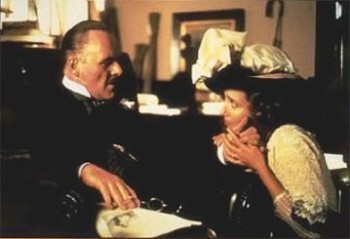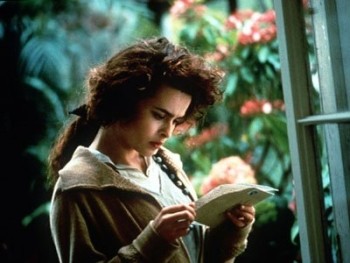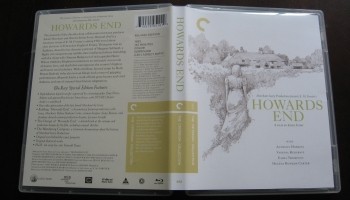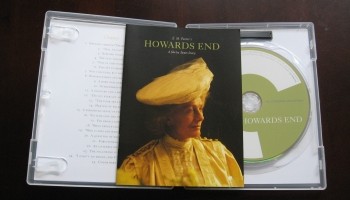| Reviews & Columns |
|
Reviews DVD TV on DVD Blu-ray 4K UHD International DVDs In Theaters Reviews by Studio Video Games Features Collector Series DVDs Easter Egg Database Interviews DVD Talk Radio Feature Articles Columns Anime Talk DVD Savant Horror DVDs The M.O.D. Squad Art House HD Talk Silent DVD
|
DVD Talk Forum |
|
|
| Resources |
|
DVD Price Search Customer Service #'s RCE Info Links |
|
Columns
|
|
|
Howards End - The Criterion Collection
The Criterion Collection // PG // November 3, 2009
List Price: $39.95 [Buy now and save at Amazon]
The Film:
Howards End is a beautiful cottage nestled into the countryside, a "shrine" of sorts for an entrepreneur's deceased wife that also embodies the epitome of old English wealth and goings-on. As a structure, it also symbolizes a transition point in social dynamics within turn-of-the-century England, with all levels of civilization fending for ownership. That's the disposition of Howards End, a Merchant Ivory production that earned nine Academy Award nominations for its potency, as it whisks us through the breaking-in point of stiff upper-class social pretense -- all in strikingly photographed and impeccably performed fashion.
Tightly based off of E.M. Forster's novel of the same name, it centers mostly on the Schlagel family and their position wedged between two different classes during 1910 England. They're middle-to-upper class intelligent folk, who dabble in the strife of the poor while exploring acumen, manners, and the finer things as expected from the upper class. More specifically, it hones in on two sisters -- Helen (Helena Bonham Carter), an artsy and whimsical type who has been caught up in the hypocritical upper-class Wilcox family by way of a thwarted marriage proposal, and Margaret (Emma Thompson), a spunky socialite who wishes to smooth things over with the Wilcox family for the trouble.
As we're introduced to all three families -- including the lower-class Basts, specifically a young married man named Leonard and his wife Jacky, that the Schlegel's try to bolster up from the lower rungs -- Howards End fervently tries to create a stiff, transitory atmosphere about the social construction between them. Though it aids in creating the characters we're exploring, it's hard to deny the blatant posturing of the characters and their social dynamics in the first half of the film, which are intentionally off-putting and pinching at the nerves. Margaret befriends aging Ruth Wilcox -- a delicate and meaningful performance from Vanessa Redgrave -- the owner of the much-harked upon Howards End, as she attempts to smooth the cracks between the Wilcox and Schlegel families. It largely turns on its ear as Ruth sees something special in Margaret, as well as her husband Henry Wilcox (Anthony Hopkins) later in the story. The presence of this sumptuous, almost mythically-presented home stirs the pot for conflict between them, as housing situations, marriage quarrels, and the plight of lower-class woes steam from the buzzing activity.
Howards End only grows truly compelling as the Schlagel family is torn at the seams by the upper and lower classes, justifying the rigidity of its character development by tailoring the characters to the exterior social factors manipulating their personalities. It all ignites with the burning of Ruth hastily-scribbled will, one that would change ownership of the Wilcox's legacy home to someone unexpected if it weren't for a sharp-toothed decision from the rest of the Wilcox clan. Howards End marks the passing of the baton to a different social class in England, as well as the uncontrollable yet slow demise of stiff-lipped, two-faced wealth as the flagstaffs of society -- with all of the braying struggles from the unwilling elites, namely the Wilcox children, and the hopeful yet desperate withering of the Basts.
 Helen and Margaret's transformations due to this paradigm shift are brought to vivid life by Helena Bonham Carter and Emma Thompson, two powerhouse performances that bolster Howards End's dramatic integrity tenfold. Helen's deeper, more empathetic nature gravitates her interest towards helping the poorer class, transforming her into a brash crusade for their well-being. Bonham Carter's darker essence pours through in one of her earlier performances, showcasing her intense capacity to communicate internal fervency through eye contact and bodily posture. It's occurs quickly and with passion, just as we'd expect from the more whimsical and passionate of the Schlegel sisters, most notably when her relationship deepens with the Bast family -- especially with Leonard, a seemingly-cornered dreamer.
Helen and Margaret's transformations due to this paradigm shift are brought to vivid life by Helena Bonham Carter and Emma Thompson, two powerhouse performances that bolster Howards End's dramatic integrity tenfold. Helen's deeper, more empathetic nature gravitates her interest towards helping the poorer class, transforming her into a brash crusade for their well-being. Bonham Carter's darker essence pours through in one of her earlier performances, showcasing her intense capacity to communicate internal fervency through eye contact and bodily posture. It's occurs quickly and with passion, just as we'd expect from the more whimsical and passionate of the Schlegel sisters, most notably when her relationship deepens with the Bast family -- especially with Leonard, a seemingly-cornered dreamer.
Margaret, on the other hand, begins to be melded by the Wilcox family into someone more befitting the upper echelon. Her tailored persona signifies the malleable nature in society even with the confident and robustly freethinking, handled with upmost precision by Emma Thompson's Oscar-winning performance. She's able to take remnants of her bubbly attitude at the start and ever-so-slightly churn them around the Wilcox family's contorted nature. Thompson's performance is similar to watching a piece of hot iron shape against a blacksmith's anvil, slowly curving to the banging of the Wilcox family's nature. She's simply brilliant here.
Howards End takes us to this social transition's period through textured, authentic production design and hazy dream-like photography from Tony Pierce-Roberts, Merchant Ivory's customary eye for capturing these wistful adaptations. Maintaining vintage color timing and a sweeping flow about the camera movement, its attentive construction drapes the temerity of the Wilcox family in a grand novel-esque fashion that never takes us from the period. This is important, since the time period is mostly a backdrop for the engaging issues that come to a head near the center of film, along with the cascade towards the conclusion that occurs at, properly, the house that started everything. Howards End exists as a stunningly cyclical drama once it reveals all of its meaningful, tension-laden cards, one that exists both as a handsome modern relic of class transformation and as a firm human drama with hypocrisy, acceptance, and transition issues that remain relevant.
The Blu-ray:
Previously available under the boutique Merchant Ivory Collection, Howards End now comes in as Spine #488 in The Criterion Collection's now-commonplace clear Blu-ray case. The artwork is extremely simple, stark white on the front and back with only a few added elements for a little flavor. Inside, a thick picture-filled Booklet is available that contains some information about the transfer and an essay, "All is Grace", by Kenneth Turan.
Video and Audio:
Presented in a lush 2.35:1 AVC encode, Criterion have constructed Howards End in a similar process to their previous Blu-ray images -- taken directly from a Datacine scanner (C-Reality) from the 35mm interpositives. Put bluntly, Howards End looks striking; exceptionally clean, crisp with splendid details, and with a visual palette all approved by both James Ivory and Tony Pierce-Roberts, the depth and range of color replication are beautiful. It maintains a bright, vivid tone about the film (purposefully rendered through a strong style of Kodak film stock) that maintains a surprisingly natural yet highly punchy tone. A natural layer of film grain adorns the image, preserving an intensely pleasing grain structure that keeps the visual treatment very film-like.
It carries a great number of impressive sequences -- namely the entire opening sequence as Vanessa Redgrave steps through blades of grass and blue flowers outside of Howards End -- that showcase striking high-definition attributes. The contrast can, at times, be a little on the grayish/greenish side, yet several instances also showcase rather deep blacks (like Helen and her suitor's clothing at the beginning). Sun-drenched sequences showcase the other side of the spectrum, allowing an extremely broad range of fluctuating greens, tremendous tans and browns, and exceptional preservation of natural visual lighting. Textures like metallic sheen and finely-constructed costume work are especially vivid, as are all the textures around Howards End itself -- from tiles, tree bark, and wood grain.
Audio comes in the form of a very mild-mannered yet exemplary DTS HD Master Audio track, taken directly from the magnetic strips at 24 bit. It concentrates mostly on preserving authenticity of the sound design, strategically placing rear-channel activity for specific effect. Most of the activity traveling to all channels comes from the musical score, which sounds astonishingly clear. The rest of the soundtrack, mostly dialogue and a few specific sound effects, stay to the front and rather robust -- especially the dialogue, which reflects against the environment to a strong atmospheric level. Subtitles are only available in English, as per Criterion's modus operandi, and only the Master Audio sound option is available.
Special Features:
Building Howards End (42:36, 16x9):
Featuring a candid interview with James Ivory and Ismail Merchant, Helena Bonham Carter, as well as costume designer Jenny Beaven and Luciana Arrigi, it explores the process in creating the characters and dramatic rhythm within Howards End. Ivory and Merchant discuss finding the film and their association with Orion Pictures, Bonham Carter's initial disinterest in shooting the picture,and the absolute necessity to land Vanessa Redgrave in the role as the "first" Mrs. Wilcox. Production and costume design also grows under focus, especially Arrigi's eagerness to start piecing together the film. She also dives into the structure of the particular house as Howards End -- being the only house they wanted.
Design of Howards End (8:57, 16x9):
Focusing more on the palette and texture of the aesthetics, production Designer Luciana Arrigi discusses how she achieves the ambiance in specific locations -- from the warmth of the shops to the "claustrophobia" of Ruth's room. Most of the feature intermixes clips from the film with a wealth of sketches, all finely detailed.
James Ivory on Ismail Merchant (12:11, 16x9):
Created in 2009, this James Ivory interview covers his relationship with Ismail Merchant. It includes several interesting clips of footage from their productions -- including The Creation of Woman, one nominated for an Oscar. Ivory discusses financing his pictures, keeping tabs on his films during the screening process, and revealing bits on Ismail Merchant as a genuinely nice and attentive guy.
Also available are The Wandering Company (49:37, 4x3), a lengthy expose covering the first twenty years of Merchant Ivory Productions that was pieced together during the construction of A Room with a View, a quick Behind The Scenes (4:31, 4x3) semi-marketing piece with cast/crew interviews, and a Theatrical Trailer (2.05, 16x9).
Final Thoughts:
E.M. Forster's novel "Howards End" sets out to explore the difficulties of a shift in class structure during England's modernizing times, and Merchant Ivory's Howards End replicates these themes with meaningful precision. Adorned with exceptional performances from Helena Bonham Carter and Emma Thompson as well as a tightly-realized aesthetic that captures the period with beauty and naturalness, it crafts a deliberate stiffness of tone in its social standing at the front for the purpose of deconstructing it before our eyes in the second half. It achieves intimacy and empathy without treading over to preachy levels, all while telling the sweeping story of the symbolism behind a sublime home and its inhabitants. Criterion's Blu-ray is an immensely vivid presentation of the film, as well as a well-stocked supplemental package, making this a Highly Recommended high-definition package of a sumptuous, meaningful drama.
Thomas Spurlin, Staff Reviewer -- DVDTalk Reviews | Personal Blog/Site
 |
Tightly based off of E.M. Forster's novel of the same name, it centers mostly on the Schlagel family and their position wedged between two different classes during 1910 England. They're middle-to-upper class intelligent folk, who dabble in the strife of the poor while exploring acumen, manners, and the finer things as expected from the upper class. More specifically, it hones in on two sisters -- Helen (Helena Bonham Carter), an artsy and whimsical type who has been caught up in the hypocritical upper-class Wilcox family by way of a thwarted marriage proposal, and Margaret (Emma Thompson), a spunky socialite who wishes to smooth things over with the Wilcox family for the trouble.
As we're introduced to all three families -- including the lower-class Basts, specifically a young married man named Leonard and his wife Jacky, that the Schlegel's try to bolster up from the lower rungs -- Howards End fervently tries to create a stiff, transitory atmosphere about the social construction between them. Though it aids in creating the characters we're exploring, it's hard to deny the blatant posturing of the characters and their social dynamics in the first half of the film, which are intentionally off-putting and pinching at the nerves. Margaret befriends aging Ruth Wilcox -- a delicate and meaningful performance from Vanessa Redgrave -- the owner of the much-harked upon Howards End, as she attempts to smooth the cracks between the Wilcox and Schlegel families. It largely turns on its ear as Ruth sees something special in Margaret, as well as her husband Henry Wilcox (Anthony Hopkins) later in the story. The presence of this sumptuous, almost mythically-presented home stirs the pot for conflict between them, as housing situations, marriage quarrels, and the plight of lower-class woes steam from the buzzing activity.
Howards End only grows truly compelling as the Schlagel family is torn at the seams by the upper and lower classes, justifying the rigidity of its character development by tailoring the characters to the exterior social factors manipulating their personalities. It all ignites with the burning of Ruth hastily-scribbled will, one that would change ownership of the Wilcox's legacy home to someone unexpected if it weren't for a sharp-toothed decision from the rest of the Wilcox clan. Howards End marks the passing of the baton to a different social class in England, as well as the uncontrollable yet slow demise of stiff-lipped, two-faced wealth as the flagstaffs of society -- with all of the braying struggles from the unwilling elites, namely the Wilcox children, and the hopeful yet desperate withering of the Basts.
 Helen and Margaret's transformations due to this paradigm shift are brought to vivid life by Helena Bonham Carter and Emma Thompson, two powerhouse performances that bolster Howards End's dramatic integrity tenfold. Helen's deeper, more empathetic nature gravitates her interest towards helping the poorer class, transforming her into a brash crusade for their well-being. Bonham Carter's darker essence pours through in one of her earlier performances, showcasing her intense capacity to communicate internal fervency through eye contact and bodily posture. It's occurs quickly and with passion, just as we'd expect from the more whimsical and passionate of the Schlegel sisters, most notably when her relationship deepens with the Bast family -- especially with Leonard, a seemingly-cornered dreamer.
Helen and Margaret's transformations due to this paradigm shift are brought to vivid life by Helena Bonham Carter and Emma Thompson, two powerhouse performances that bolster Howards End's dramatic integrity tenfold. Helen's deeper, more empathetic nature gravitates her interest towards helping the poorer class, transforming her into a brash crusade for their well-being. Bonham Carter's darker essence pours through in one of her earlier performances, showcasing her intense capacity to communicate internal fervency through eye contact and bodily posture. It's occurs quickly and with passion, just as we'd expect from the more whimsical and passionate of the Schlegel sisters, most notably when her relationship deepens with the Bast family -- especially with Leonard, a seemingly-cornered dreamer. Margaret, on the other hand, begins to be melded by the Wilcox family into someone more befitting the upper echelon. Her tailored persona signifies the malleable nature in society even with the confident and robustly freethinking, handled with upmost precision by Emma Thompson's Oscar-winning performance. She's able to take remnants of her bubbly attitude at the start and ever-so-slightly churn them around the Wilcox family's contorted nature. Thompson's performance is similar to watching a piece of hot iron shape against a blacksmith's anvil, slowly curving to the banging of the Wilcox family's nature. She's simply brilliant here.
Howards End takes us to this social transition's period through textured, authentic production design and hazy dream-like photography from Tony Pierce-Roberts, Merchant Ivory's customary eye for capturing these wistful adaptations. Maintaining vintage color timing and a sweeping flow about the camera movement, its attentive construction drapes the temerity of the Wilcox family in a grand novel-esque fashion that never takes us from the period. This is important, since the time period is mostly a backdrop for the engaging issues that come to a head near the center of film, along with the cascade towards the conclusion that occurs at, properly, the house that started everything. Howards End exists as a stunningly cyclical drama once it reveals all of its meaningful, tension-laden cards, one that exists both as a handsome modern relic of class transformation and as a firm human drama with hypocrisy, acceptance, and transition issues that remain relevant.
The Blu-ray:
 |  |
Previously available under the boutique Merchant Ivory Collection, Howards End now comes in as Spine #488 in The Criterion Collection's now-commonplace clear Blu-ray case. The artwork is extremely simple, stark white on the front and back with only a few added elements for a little flavor. Inside, a thick picture-filled Booklet is available that contains some information about the transfer and an essay, "All is Grace", by Kenneth Turan.
Video and Audio:
Presented in a lush 2.35:1 AVC encode, Criterion have constructed Howards End in a similar process to their previous Blu-ray images -- taken directly from a Datacine scanner (C-Reality) from the 35mm interpositives. Put bluntly, Howards End looks striking; exceptionally clean, crisp with splendid details, and with a visual palette all approved by both James Ivory and Tony Pierce-Roberts, the depth and range of color replication are beautiful. It maintains a bright, vivid tone about the film (purposefully rendered through a strong style of Kodak film stock) that maintains a surprisingly natural yet highly punchy tone. A natural layer of film grain adorns the image, preserving an intensely pleasing grain structure that keeps the visual treatment very film-like.
It carries a great number of impressive sequences -- namely the entire opening sequence as Vanessa Redgrave steps through blades of grass and blue flowers outside of Howards End -- that showcase striking high-definition attributes. The contrast can, at times, be a little on the grayish/greenish side, yet several instances also showcase rather deep blacks (like Helen and her suitor's clothing at the beginning). Sun-drenched sequences showcase the other side of the spectrum, allowing an extremely broad range of fluctuating greens, tremendous tans and browns, and exceptional preservation of natural visual lighting. Textures like metallic sheen and finely-constructed costume work are especially vivid, as are all the textures around Howards End itself -- from tiles, tree bark, and wood grain.
Audio comes in the form of a very mild-mannered yet exemplary DTS HD Master Audio track, taken directly from the magnetic strips at 24 bit. It concentrates mostly on preserving authenticity of the sound design, strategically placing rear-channel activity for specific effect. Most of the activity traveling to all channels comes from the musical score, which sounds astonishingly clear. The rest of the soundtrack, mostly dialogue and a few specific sound effects, stay to the front and rather robust -- especially the dialogue, which reflects against the environment to a strong atmospheric level. Subtitles are only available in English, as per Criterion's modus operandi, and only the Master Audio sound option is available.
Special Features:
Building Howards End (42:36, 16x9):
Featuring a candid interview with James Ivory and Ismail Merchant, Helena Bonham Carter, as well as costume designer Jenny Beaven and Luciana Arrigi, it explores the process in creating the characters and dramatic rhythm within Howards End. Ivory and Merchant discuss finding the film and their association with Orion Pictures, Bonham Carter's initial disinterest in shooting the picture,and the absolute necessity to land Vanessa Redgrave in the role as the "first" Mrs. Wilcox. Production and costume design also grows under focus, especially Arrigi's eagerness to start piecing together the film. She also dives into the structure of the particular house as Howards End -- being the only house they wanted.
Design of Howards End (8:57, 16x9):
Focusing more on the palette and texture of the aesthetics, production Designer Luciana Arrigi discusses how she achieves the ambiance in specific locations -- from the warmth of the shops to the "claustrophobia" of Ruth's room. Most of the feature intermixes clips from the film with a wealth of sketches, all finely detailed.
James Ivory on Ismail Merchant (12:11, 16x9):
Created in 2009, this James Ivory interview covers his relationship with Ismail Merchant. It includes several interesting clips of footage from their productions -- including The Creation of Woman, one nominated for an Oscar. Ivory discusses financing his pictures, keeping tabs on his films during the screening process, and revealing bits on Ismail Merchant as a genuinely nice and attentive guy.
Also available are The Wandering Company (49:37, 4x3), a lengthy expose covering the first twenty years of Merchant Ivory Productions that was pieced together during the construction of A Room with a View, a quick Behind The Scenes (4:31, 4x3) semi-marketing piece with cast/crew interviews, and a Theatrical Trailer (2.05, 16x9).
Final Thoughts:
E.M. Forster's novel "Howards End" sets out to explore the difficulties of a shift in class structure during England's modernizing times, and Merchant Ivory's Howards End replicates these themes with meaningful precision. Adorned with exceptional performances from Helena Bonham Carter and Emma Thompson as well as a tightly-realized aesthetic that captures the period with beauty and naturalness, it crafts a deliberate stiffness of tone in its social standing at the front for the purpose of deconstructing it before our eyes in the second half. It achieves intimacy and empathy without treading over to preachy levels, all while telling the sweeping story of the symbolism behind a sublime home and its inhabitants. Criterion's Blu-ray is an immensely vivid presentation of the film, as well as a well-stocked supplemental package, making this a Highly Recommended high-definition package of a sumptuous, meaningful drama.
|
| Popular Reviews |
| Sponsored Links |
|
|
| Sponsored Links |
|
|
| Release List | Reviews | Shop | Newsletter | Forum | DVD Giveaways | Blu-Ray | Advertise |
|
Copyright 2024 DVDTalk.com All Rights Reserved. Legal Info, Privacy Policy, Terms of Use,
Manage Preferences,
Your Privacy Choices | |||||||













